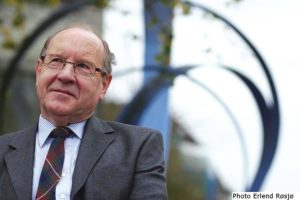I was born in Bergen, Norway, 23 June 1935, and grew up in a small farming community some 25 kilometres north of the city.
1962: Graduated from Bergen University with a major in geophysics (M.Sc. thesis in solid Earth physics), with applied mathematics and geology as subsidiary subjects.
1962-1963: Scholarship holder for studies of palaeomagnetism at the Department of Physics, University of Newcastle-upon-Tyne.
1963-1973: Lecturer, from 1968 Senior lecturer, in geophysics, University of Bergen.
1969: Doctorate in geophysics (thesis on “Remagnetization problems in palaeomagnetism”), University of Bergen.
1973-2005: Professor of Geophysics – Chair in geomagnetism, University of Bergen.
Visiting professor at: Oliver Lodge Laboratory, Liverpool University (UK) 1972-1973; Department of Geophysics, University of Western Ontario (Canada) 1976-1977; Department of Physics, Memorial University of Newfoundland (Canada) 1985; Department of Physics, University of Newcastle-upon-Tyne 1988-1989.
In previous years I was heavily involved with science administration – at my local university, and in honorary international capacities. Thus, from 1976 to 1988 I held various offices in the European Geophysical Society (EGS) – serving as the Society’s Treasurer 1982-1988.
At a 1988-1989 sabbatical leave, my longstanding questioning about the foundations of plate tectonics came to a dramatic conclusion. The first version of a new theory of the Earth – Global Wrench Tectonics, discarding all plate tectonic principles – was born. In consequence, my traditional academic life had come to an end.
Since 1989 I have lectured widely on the artificiality into which the plate tectonic model has driven the Earth sciences in recent decades – how the popular but unconfirmed notions and arguments have lost their forward-looking aspects and become a hindrance to progress.
Since 1989 my new theory of the Earth – Global Wrench Tectonics – has been presented in guest lectures and seminars at more than 50 universities and research institutions around the world.
The state of the art in global geo science has been outlined in my books Our Evolving Planet (1997, 456 p) and Global Wrench Tectonics (2003, 397 p).
Scientists turning away from the stream are traditionally disapproved of; group machinations are released in order to bring them back in line. At the time of my retirement in 2005 I published my autobiographical notes (in Norwegian) describing these darker sides of science.

